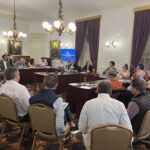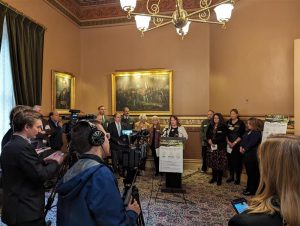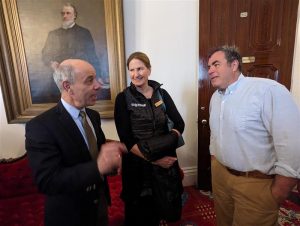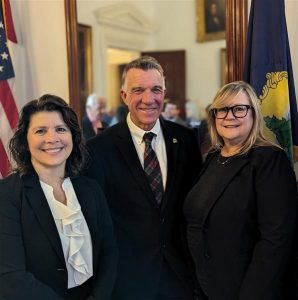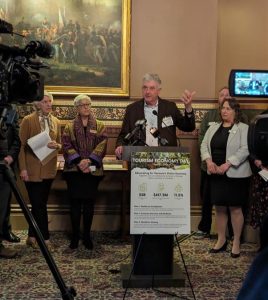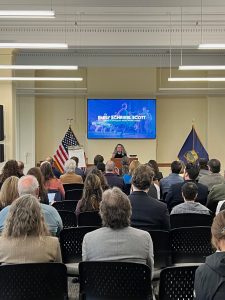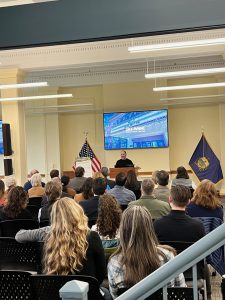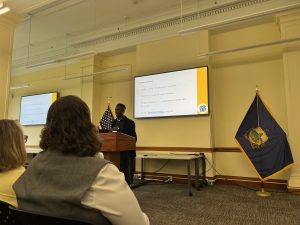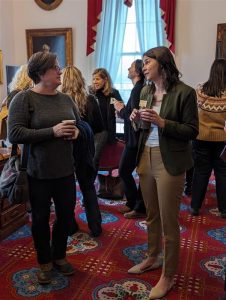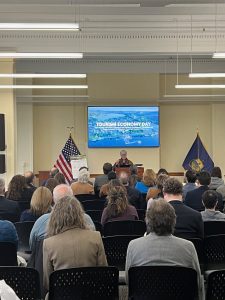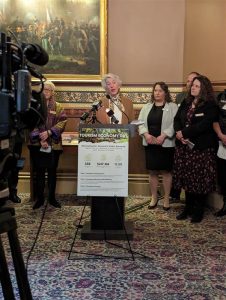Over 100 tourism and hospitality industry leaders gathered at the State House on April 11 to engage with legislators and raise awareness of the collective contributions of these industries to the Vermont economy. “Tourism Economy Day,” convened by the Vermont Chamber of Commerce and Ski Vermont, brought businesses together to advocate for a thriving Vermont visitor economy.
The Vermont visitor economy has a $3 billion annual economic impact, supports 35,000 jobs, and represents 11.5% of our workforce. Businesses, legislative leaders, and Administration officials collaborated for a day of advocacy that elevated the collective contributions of the visitor economy to Vermont. A coffee hour with Governor Scott, a joint hearing with the House Commerce and Economic Development Committee and the Senate Economic Development, Housing, and General Affairs Committee, a Resolution reading on the floor of the House of Representatives, an evening food and beverage tasting reception with the Vermont Specialty Food Association all took place throughout the day.
Rep. Stephanie Zak Jerome (Rutland-9), a stalwart supporter of the tourism industry, offered a House Resolution, H.C.R 211. “The Vermont visitor economy remains a vital engine powering our state and bolstering our businesses and local economy. This annual event provides an opportunity for industry leaders from across Vermont to testify on the importance of their work, speak directly to legislators, and elevate the importance of the tourism and hospitality sectors in the State House,” commented Rep. Jerome.
“The Vermont Chamber has a proven track record of bringing businesses together with a shared purpose to work together to build a stronger Vermont economy,” said Amy Spear Vice President of Tourism for the Vermont Chamber of Commerce. “This year’s event focused on advocating for strategic initiatives to bolster business success and contribute to the vitality and resiliency of our state: workforce development, economic recovery and resiliency, and workforce housing.”
“Outdoor recreation relies on sustaining a healthy and thriving environment and is vital to Vermont’s $1.9 billion outdoor recreation tourism economy,” says Ski Vermont President Molly Mahar. “Vermont’s ski areas understand the importance of sustainable stewardship for tourism and its economic benefit to their local communities and across the state. For decades they have worked to support and enhance the state’s capacity for outdoor recreation while protecting the environment and reducing carbon emissions. They maintain that focus so current and future generations can continue to enjoy all that Vermont has to offer.”
Business leaders centered their advocacy on three key pillars of opportunity: workforce development investments in training and education to meet industry demands, economic recovery and resiliency programs to address and anticipate economic injuries from disasters, and workforce housing solutions to meet future needs.
“Friends, mentors, and colleagues have had to shutter their businesses in the wake of recent catastrophes. It’s heartbreaking,” stated Stefano Coppola, Chef and Owner of Morse Block Deli & Taps. “While the State’s work to help businesses through the pandemic, and later the flood, was commendable, there is still much progress to be made. We need additional support so that when something like this happens again, we are more prepared to help the hospitality industry.”
“By investing in education and workforce development, we can cultivate future leaders and ensure the sustainability of our vibrant tourism economy,” stated Hans van Wees, General Manager of Hotel Vermont and Co-Chair of the Vermont Lodging Association. “Our goal is to empower high school graduates, career changers, and current industry professionals through targeted programs that bridge the gap between education and practical experience.”
Additional business and policy leaders that testified were: Charles Tino Rutanhira of the Vermont Professionals of Color Network, Jay Wahl of The Flynn, Emily Schriebl Scott of the Weston Theater Company, Andrew Stenger of Jay Peak Resort, Bob Grim of Foam Brewers, Hans van Wees of Hotel Vermont and the Vermont Lodging Association, and Heather Pelham, Commissioner of the Department of Tourism & Marketing.






